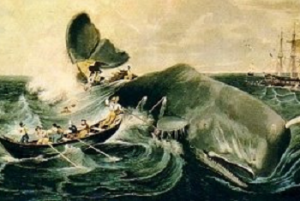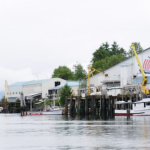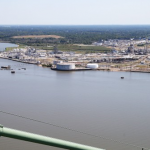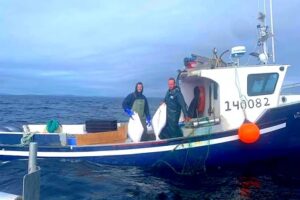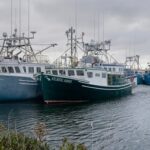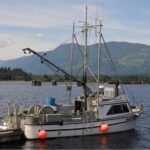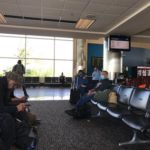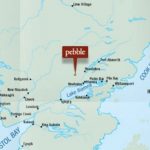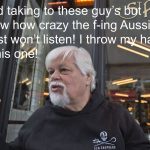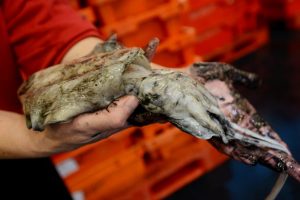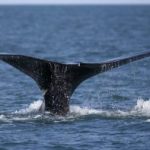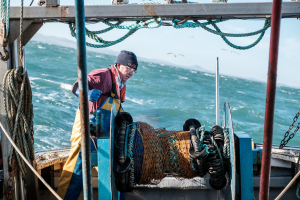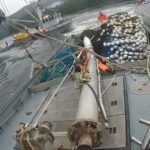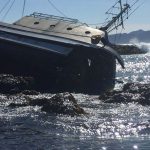Tag Archives: FFAW
Changing tides: Panel sides with union’s snow crab pricing formula
 Its decision was not unanimous, but the provincial Standing Fish Price-Setting Panel has selected the final offer from fish harvesters as the price for snow crab for the 2025 season. The season began in most areas on Thursday, April 10, but it was not until late afternoon that the panel decision was announced. The three-person panel — chaired by Sheilagh Murphy and including Earle McCurdy and Brian Vallis — heard submissions from FFAW-Unifor and the Association of Seafood Producers (ASP) on April 6. While the full written reasons for the majority and dissenting opinions will be made public later, the panel’s letter to the provincial government about its decision indicated Vallis held the lone dissenting opinion among the panel members. more, >>CLICK TO READ<< 08:26
Its decision was not unanimous, but the provincial Standing Fish Price-Setting Panel has selected the final offer from fish harvesters as the price for snow crab for the 2025 season. The season began in most areas on Thursday, April 10, but it was not until late afternoon that the panel decision was announced. The three-person panel — chaired by Sheilagh Murphy and including Earle McCurdy and Brian Vallis — heard submissions from FFAW-Unifor and the Association of Seafood Producers (ASP) on April 6. While the full written reasons for the majority and dissenting opinions will be made public later, the panel’s letter to the provincial government about its decision indicated Vallis held the lone dissenting opinion among the panel members. more, >>CLICK TO READ<< 08:26
Local Fishing Industry Worried About Potential Environmental Risks from Baltic III
 People in the Bay of Islands are worried that a ship which ran aground in the winter is still sitting there, posing a significant threat to the rich fishing grounds off Lark Harbour and York Harbour. FFAW President Dwan Street notes that the Baltic III is sitting on the rocks in Cedar Cove with hazardous materials and fuel onboard. She says they have seen reports of structural damage, leaks, and an oily mixture in the engine room. The longer the situation drags on, the greater the risk of a spill says the FFAW. more, >>CLICK TO READ<< 14:03
People in the Bay of Islands are worried that a ship which ran aground in the winter is still sitting there, posing a significant threat to the rich fishing grounds off Lark Harbour and York Harbour. FFAW President Dwan Street notes that the Baltic III is sitting on the rocks in Cedar Cove with hazardous materials and fuel onboard. She says they have seen reports of structural damage, leaks, and an oily mixture in the engine room. The longer the situation drags on, the greater the risk of a spill says the FFAW. more, >>CLICK TO READ<< 14:03
Off to court: Why NL crab processors have filed a Supreme Court application claiming political interference
 The Association of Seafood Producers has formally taken legal action against Fisheries, Forestry and Agriculture Minister Gerry Byrne and FFAW-Unifor over the delay in determining a pricing formula for snow crab. The ASP has filed an application before the Supreme Court of Newfoundland and Labrador, seeking a prerogative order in respect of Byrne’s decision to allow a delay of the decision to be made by the province’s Standing Fish Price-Setting Panel. The decision was already bumped back once to allow representatives to attend the Boston seafood show, considered a key event due to the tariff war, but was bumped back again shortly before the deadline this past weekend. more, >>CLICK TO READ<< 07:47
The Association of Seafood Producers has formally taken legal action against Fisheries, Forestry and Agriculture Minister Gerry Byrne and FFAW-Unifor over the delay in determining a pricing formula for snow crab. The ASP has filed an application before the Supreme Court of Newfoundland and Labrador, seeking a prerogative order in respect of Byrne’s decision to allow a delay of the decision to be made by the province’s Standing Fish Price-Setting Panel. The decision was already bumped back once to allow representatives to attend the Boston seafood show, considered a key event due to the tariff war, but was bumped back again shortly before the deadline this past weekend. more, >>CLICK TO READ<< 07:47
ASP takes provincial government to court, alleging ‘political interference’ over pushing crab price deadline
 The Association of Seafood Producers is accusing the Newfoundland and Labrador government of interfering in the price setting process for the annual snow crab harvest, and it’s launching legal action against the province as well as the Fish, Food and Allied Workers union. The deadline for price setting was April 1, but last week Fisheries Minister Gerry Byrne shifted the date to April 13. According to documents filed at the Supreme Court of Newfoundland and Labrador, the ASP has turned to the courts to quash that order. “This matter is urgent. The fishery was to have started on April 1, 2025. The fisheries minister had improperly interfered with the operation of the panel as the purported date change in ultra vires,” wrote lawyer Stephen Penney in the ASP’s application. more, >>CLICK TO READ<< 12:06
The Association of Seafood Producers is accusing the Newfoundland and Labrador government of interfering in the price setting process for the annual snow crab harvest, and it’s launching legal action against the province as well as the Fish, Food and Allied Workers union. The deadline for price setting was April 1, but last week Fisheries Minister Gerry Byrne shifted the date to April 13. According to documents filed at the Supreme Court of Newfoundland and Labrador, the ASP has turned to the courts to quash that order. “This matter is urgent. The fishery was to have started on April 1, 2025. The fisheries minister had improperly interfered with the operation of the panel as the purported date change in ultra vires,” wrote lawyer Stephen Penney in the ASP’s application. more, >>CLICK TO READ<< 12:06
FFAW to meet with federal fishery minister, DFO on Monday morning

Richard Gillett says harvesters are fighting for their livelihoods.
It might have taken a show of numbers, but representatives of Newfoundland and Labrador fish harvesters are scheduled to meet with the federal fisheries minister and Department of Fisheries and Oceans officials on Monday morning. Hundreds of fish harvesters gathered outside of the St. John’s Convention Centre on Sunday evening as Liberal Leader Mark Carney made his first campaign stop. The group was protesting recent cuts to the snow crab catch in some regions. FFAW president Dwan Street, speaking outside the convention centre, said after days of trying to get a meeting with Fisheries Minister Joanne Thompson, she was finally able to meet with her about DFO cutting snow crab quotas in areas like 3K. more, >>CLICK TO READ<< 10:51
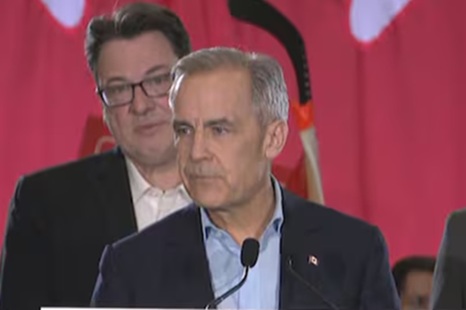
Carney acknowledges protesting N.L. fish harvesters during 1st campaign stop
Liberal Leader Mark Carney kicked off his election campaign in St. John’s on Sunday, promising tax cuts and also addressing the hundreds of protesting fish harvesters outside the city’s convention centre. Protesters continued to block the lobby, despite securing a meeting with Fisheries Minister Joanne Thompson and a promise to look at restructuring the Department of Fisheries and Oceans. A heavy police and security presence remained at the centre on Sunday evening, as police guided Liberal attendees through alternative exits. During his speech, Carney acknowledged the protesting harvesters, and said he is there to listen. He said his government will take a closer look at the department of Fisheries and Oceans, with the goal of creating a sustainable fishery and potentially restructuring the department. Videos, photos, more, >>CLICK TO READ<< 06:31
FFAW Demands Reassessment of DFO’s Snow Crab Quota Cuts Following Overnight Protest
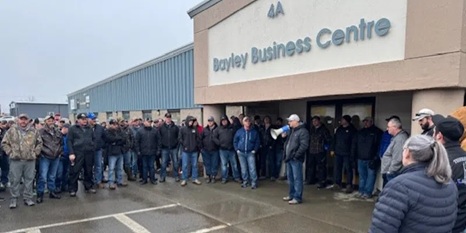 The FFAW says it has been told by the Department of Fisheries and Oceans that a reduction is coming for snow crab in the 3K zone. The union says it has been told that a 25 per cent reduction was coming for offshore harvesters and 20 per cent for inshore. The union said late Friday night that the move is “misaligned with the ecological realities of the region.” On Friday, some 200 harvesters rallied outside the DFO office in Grand Falls-Windsor to protest proposed cuts to the snow crab quota in area 3K. Meanwhile, the FFAW says their occupation of the DFO office in Grand Falls-Windsor overnight Friday was peaceful, despite not being invited into the office. Photos, links, more, >>CLICK TO READ<< 10:47
The FFAW says it has been told by the Department of Fisheries and Oceans that a reduction is coming for snow crab in the 3K zone. The union says it has been told that a 25 per cent reduction was coming for offshore harvesters and 20 per cent for inshore. The union said late Friday night that the move is “misaligned with the ecological realities of the region.” On Friday, some 200 harvesters rallied outside the DFO office in Grand Falls-Windsor to protest proposed cuts to the snow crab quota in area 3K. Meanwhile, the FFAW says their occupation of the DFO office in Grand Falls-Windsor overnight Friday was peaceful, despite not being invited into the office. Photos, links, more, >>CLICK TO READ<< 10:47
Snow crab now crab as FFAW and ASP show willingness to work together
 A week of long days and almost around the clock negotiations has left the Fish, Food and Allied Workers union and the Association of Seafood Producers optimistic that a snow crab harvest will happen this year. “The FFAW and ASP have done an incredible job together to have constructive conversations at this point,” ASP executive director Jeff Loder said Wednesday. “Of course, until you get a deal, you have no deal. But I am cautiously optimistic that we are close.” The two sides are keen to negotiate a deal as soon as possible. A meeting with a price setting panel is scheduled for March 20 should the two sides not make an agreement by then. Video, more, >>CLICK TO READ<< 06:08
A week of long days and almost around the clock negotiations has left the Fish, Food and Allied Workers union and the Association of Seafood Producers optimistic that a snow crab harvest will happen this year. “The FFAW and ASP have done an incredible job together to have constructive conversations at this point,” ASP executive director Jeff Loder said Wednesday. “Of course, until you get a deal, you have no deal. But I am cautiously optimistic that we are close.” The two sides are keen to negotiate a deal as soon as possible. A meeting with a price setting panel is scheduled for March 20 should the two sides not make an agreement by then. Video, more, >>CLICK TO READ<< 06:08
Quin-Sea takes a flamethrower to the ASP as it departs fisheries group
 A dispute that’s smoldered for weeks in the Newfoundland and Labrador fishing industry has erupted into an inferno, with Quin-Sea Fisheries dropping a metaphorical hand grenade as it cuts ties with the trade association that represents most seafood producers in the province. In a strongly worded news release issued Monday morning, the St. John’s-based company said it was withdrawing from the Association of Seafood Producers, saying it could no longer tolerate the ASP’s “internal strong-arming and mistreatment” of members. The decision comes after many months of strained relations between Quin-Sea and the ASP and is more fallout from a contentious period in the fishery dating back to last winter, when harvesters protested in a bid to bring more free enterprise to the industry. more, >>CLICK TO READ<< 15:38
A dispute that’s smoldered for weeks in the Newfoundland and Labrador fishing industry has erupted into an inferno, with Quin-Sea Fisheries dropping a metaphorical hand grenade as it cuts ties with the trade association that represents most seafood producers in the province. In a strongly worded news release issued Monday morning, the St. John’s-based company said it was withdrawing from the Association of Seafood Producers, saying it could no longer tolerate the ASP’s “internal strong-arming and mistreatment” of members. The decision comes after many months of strained relations between Quin-Sea and the ASP and is more fallout from a contentious period in the fishery dating back to last winter, when harvesters protested in a bid to bring more free enterprise to the industry. more, >>CLICK TO READ<< 15:38
FFAW Calls for Transparency and Accountability in Fish Harvesters’ Resource Centre
 FFAW-Unifor President Dwan Street is calling for the Fish Harvesters’ Resource Centre (FRC) to operate with transparency and accountability. The FRC, a nonprofit governed by a board of directors providing dockside monitoring services to fish harvesters in Newfoundland and Labrador, has refused to call a board meeting and provide members with important information regarding the organization’s operations. “Our elected Inshore Council has been calling for increased transparency and accountability regarding the boards our Union participates on,” says President Dwan Street. “Specifically, they’ve asked us to ensure board seats are representative of the current industry and elected leadership. Despite repeated attempts to engage the FRC over the last year, Executive Director Velma Pike and Chair Bill Broderick refuse to be transparent about their operations,” Street explains. more, >>CLICK TO READ<< 07:02
FFAW-Unifor President Dwan Street is calling for the Fish Harvesters’ Resource Centre (FRC) to operate with transparency and accountability. The FRC, a nonprofit governed by a board of directors providing dockside monitoring services to fish harvesters in Newfoundland and Labrador, has refused to call a board meeting and provide members with important information regarding the organization’s operations. “Our elected Inshore Council has been calling for increased transparency and accountability regarding the boards our Union participates on,” says President Dwan Street. “Specifically, they’ve asked us to ensure board seats are representative of the current industry and elected leadership. Despite repeated attempts to engage the FRC over the last year, Executive Director Velma Pike and Chair Bill Broderick refuse to be transparent about their operations,” Street explains. more, >>CLICK TO READ<< 07:02
Going after the big fish: New union president vows to take on whoever stands in the way of Newfoundland and Labrador fishery
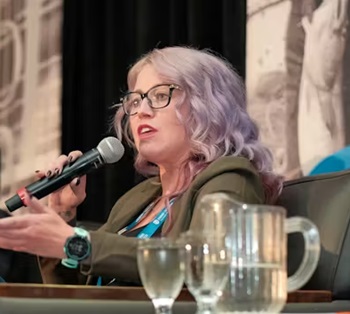 Vibes of positive energy permeated FFAW-Unifor’s recent annual convention in Gander, and the union’s new president hopes to carry that momentum forward into what she envisions will be a new era for the fishery in Newfoundland and Labrador. Dwan Street is the first woman to ever hold the presidency of the union that represents the province’s inshore fish harvesters and plant workers, and she’s ready to roll up her sleeves and get to work now that the convention celebration is over. She’s not interested in discrediting any past executives, but Street said it’s clear there needs to be fresh, new approaches to helping make life better for harvesters and plant workers. more, >>CLICK TO READ<< 08:52
Vibes of positive energy permeated FFAW-Unifor’s recent annual convention in Gander, and the union’s new president hopes to carry that momentum forward into what she envisions will be a new era for the fishery in Newfoundland and Labrador. Dwan Street is the first woman to ever hold the presidency of the union that represents the province’s inshore fish harvesters and plant workers, and she’s ready to roll up her sleeves and get to work now that the convention celebration is over. She’s not interested in discrediting any past executives, but Street said it’s clear there needs to be fresh, new approaches to helping make life better for harvesters and plant workers. more, >>CLICK TO READ<< 08:52
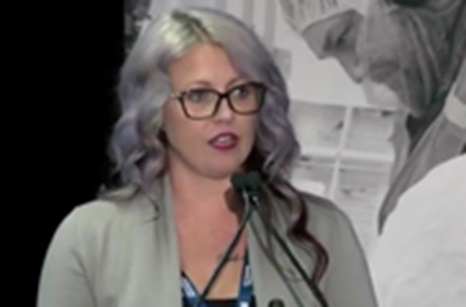
Dwan Street says FFAW won’t shy away from a fight as first woman to lead union takes reins
In a fiery introduction speech in front of members of the Fish, Food and Allied Workers union, new leader Dwan Street said Tuesday her presidency also marks the start of a new era in the Newfoundland and Labrador fishery. “One where our voices will become louder. Where we are not afraid to rattle cages. And from what I’m hearing, there are a few rattled right now,” Street said in Gander. Street, originally from Spillar’s Cove on the Bonavista Peninsula, was elected in July as the first woman to lead the union that represents about 15,000 people in Newfoundland and Labrador. She replaces former president Greg Pretty and takes the leadership as a time when the FFAW — a force in Newfoundland and Labrador labour, industry and politics for more than five decades — has been accused of not being tough enough in speaking up for members’ interests. High-profile protests earlier this year, for instance, were organized from outside the union’s leadership. Video, more >>CLICK TO READ<< 11:20
FFAW says it wants to reclaim its right to strike — but only over snow crab
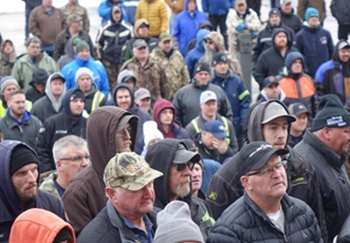 The Newfoundland and Labrador government is opening the door for seafood harvesters in the province to reclaim their right to strike, but the harvesters’ union is signalling it only wants that right for a single species — a proposal that the fisheries minister says likely isn’t legal. Minister Gerry Byrne announced several proposed changes to fishing industry regulations Monday in what he billed as an effort to advance free enterprise. Those proposals included a green light from government to return to strikes and lockout processes when collective bargaining fails, and a move away from the final-offer selection model implemented in Newfoundland and Labrador two decades ago. Under the current model, the Fish, Food and Allied Workers union and Association of Seafood Producers both make offers about pricing and an independent arbitrator chooses between those offers, thus avoiding lockouts and strikes. more, >>CLICK TO READ<< 15:23
The Newfoundland and Labrador government is opening the door for seafood harvesters in the province to reclaim their right to strike, but the harvesters’ union is signalling it only wants that right for a single species — a proposal that the fisheries minister says likely isn’t legal. Minister Gerry Byrne announced several proposed changes to fishing industry regulations Monday in what he billed as an effort to advance free enterprise. Those proposals included a green light from government to return to strikes and lockout processes when collective bargaining fails, and a move away from the final-offer selection model implemented in Newfoundland and Labrador two decades ago. Under the current model, the Fish, Food and Allied Workers union and Association of Seafood Producers both make offers about pricing and an independent arbitrator chooses between those offers, thus avoiding lockouts and strikes. more, >>CLICK TO READ<< 15:23
3Ps Stock Assessment Update Highlights Need to Ban Offshore Draggers and Address Seal Predation
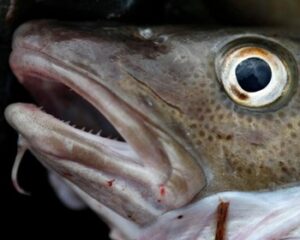 11/5/2024 – Today’s technical briefing by the Department of Fisheries and Oceans (DFO) on the 3Ps cod stock assessment delivered news that the south coast species has not experienced much growth in recent years, leaving harvesters concerned for the stock’s future and the impact the offshore dragger fishery is having on the stock’s recovery. FFAW is once again reiterating the need to ban factory draggers from all cod species in Newfoundland and Labrador, citing the continued and lasting damaged caused by draggers fishing on pre-spawning aggregations. more, >>CLICK TO READ<< 10:57
11/5/2024 – Today’s technical briefing by the Department of Fisheries and Oceans (DFO) on the 3Ps cod stock assessment delivered news that the south coast species has not experienced much growth in recent years, leaving harvesters concerned for the stock’s future and the impact the offshore dragger fishery is having on the stock’s recovery. FFAW is once again reiterating the need to ban factory draggers from all cod species in Newfoundland and Labrador, citing the continued and lasting damaged caused by draggers fishing on pre-spawning aggregations. more, >>CLICK TO READ<< 10:57
Redfish harvesters call on Ottawa to reverse decision requiring observers for each trip
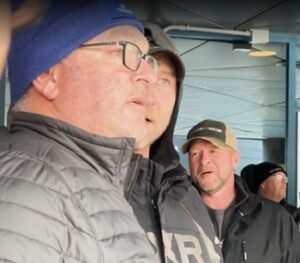 Fish harvesters on the west coast of Newfoundland are calling on Ottawa to overturn a decision they say could keep them from fishing for redfish and brought their concerns to the Department of Fisheries and Oceans office in Corner Brook on Monday. Dwan Street, president-elect of the Fish, Food and Allied Workers union, said harvesters face the requirement of an at-sea observer, which ensures compliance with fishery guidelines on every trip they take. Observers must also be paid for by harvesters, with DFO saying those who benefit from the resource should assist in paying for its management. A crowd of around 60 people took calls for change to the DFO office in Corner Brook Monday, which was closed before protestors arrived. For fishermen like Conway Caines, the issue boils down to two main factors: Not enough observers are available, and it’s another added expense crews might not be able to handle. Photos, Video, more, >>CLICK TO READ<< 18:36
Fish harvesters on the west coast of Newfoundland are calling on Ottawa to overturn a decision they say could keep them from fishing for redfish and brought their concerns to the Department of Fisheries and Oceans office in Corner Brook on Monday. Dwan Street, president-elect of the Fish, Food and Allied Workers union, said harvesters face the requirement of an at-sea observer, which ensures compliance with fishery guidelines on every trip they take. Observers must also be paid for by harvesters, with DFO saying those who benefit from the resource should assist in paying for its management. A crowd of around 60 people took calls for change to the DFO office in Corner Brook Monday, which was closed before protestors arrived. For fishermen like Conway Caines, the issue boils down to two main factors: Not enough observers are available, and it’s another added expense crews might not be able to handle. Photos, Video, more, >>CLICK TO READ<< 18:36
Fisheries Minister Rejects Opposition’s Approach to Processing Controversy, Hints at ‘Significant’ Regulatory Changes
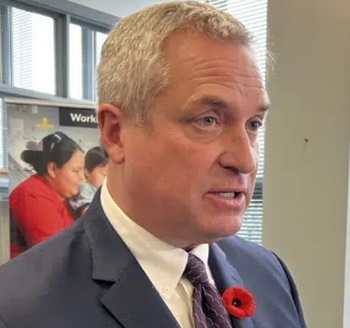 Provincial Fisheries Minister Gerry Bryne is hinting that some “significant changes” could be coming in relation to fish processors who run afoul of the regulatory process. Royal Greenland, which owns Quin-Sea, is currently before the Labour Relations Board after the Association of Seafood Producers filed an urgent application against the company. According to the FFAW, Royal Greenland failed to provide sales data on 5-8 ounce sections of crab delivered to Boston as required for a third-party review of 2024 snow crab sales. more, >>CLICK TO READ<< 07:25
Provincial Fisheries Minister Gerry Bryne is hinting that some “significant changes” could be coming in relation to fish processors who run afoul of the regulatory process. Royal Greenland, which owns Quin-Sea, is currently before the Labour Relations Board after the Association of Seafood Producers filed an urgent application against the company. According to the FFAW, Royal Greenland failed to provide sales data on 5-8 ounce sections of crab delivered to Boston as required for a third-party review of 2024 snow crab sales. more, >>CLICK TO READ<< 07:25

The fatal truth about commercial fishing
A note from the authors: Dear readers, we have wanted to cover this story for a long time. Given the fishing tragedies this province has endured, we acknowledge this is a difficult subject. This reporting honours those lost at sea, doing what they loved most: fishing. We recognize the collective grief of families, communities and the entire province. We hope this work illuminates what’s going wrong on the water and helps bring more fish harvesters home safely. Inshore harvesters dealing with trauma after incidents like the ones we describe can access PTSD coverage through workers’ compensation (WorkplaceNL). For anyone else, 811 can connect you with mental health supports in your community.
“My god, what are you doing to me?” says Brenda Gould, remembering the words she shouted into the sky that fateful day in 1989. The Port au Choix woman had just learned that her 22-year-old son Brendan, known as Ben, drowned while fishing off the coast of the Northern Peninsula. It wasn’t the first time tragedy knocked at Gould’s door. Eleven years earlier, in 1978, her husband Gabriel, 35, also drowned while fishing. Photos, Video, more, >>CLICK TO READ<< 17:41
Federal court denies FFAW request for injunction against reopening of northern cod fishery
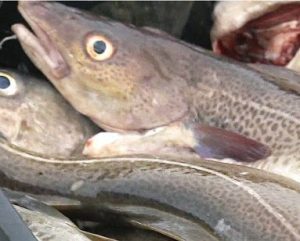 Federal court denies FFAW request for injunction against reopening of northern cod fishery. In July 2024, the FFAW requested a judicial review of the federal fisheries departments’ decision to reopen the northern cod fishery with a total allowable catch of 18,000 tonnes. Later, the FFAW requested an injunction against federal Fisheries Minister Diane Lebouthillier’s decision, made in June, to allocate 18,000 tonnes of cod for Canadian harvesters, and 1,080 tonnes for the offshore sector. Yesterday, the court denied the request for an injunction, stating that FFAW failed to demonstrate that irreparable harm. more, >>CLICK TO READ<< 11:25
Federal court denies FFAW request for injunction against reopening of northern cod fishery. In July 2024, the FFAW requested a judicial review of the federal fisheries departments’ decision to reopen the northern cod fishery with a total allowable catch of 18,000 tonnes. Later, the FFAW requested an injunction against federal Fisheries Minister Diane Lebouthillier’s decision, made in June, to allocate 18,000 tonnes of cod for Canadian harvesters, and 1,080 tonnes for the offshore sector. Yesterday, the court denied the request for an injunction, stating that FFAW failed to demonstrate that irreparable harm. more, >>CLICK TO READ<< 11:25
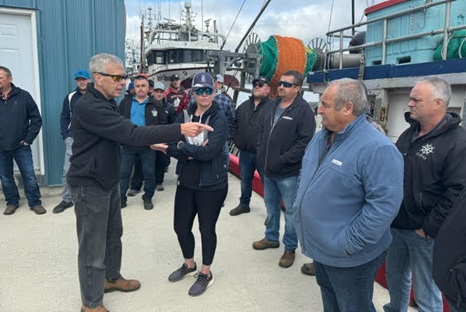
Call for Changes to Gulf of St. Lawrence Redfish Fishery Management, Inshore Fleet Demands Immediate Action
The 4R inshore fleet is calling on the Department of Fisheries and Oceans (DFO) to implement immediate changes to the management of the Gulf of St. Lawrence Unit 1 Redfish Fishery. Dozens of harvesters rallied outside the Barry Group plant in Curling today as members look to the federal government for urgent changes to access the small, time sensitive fishery. “DFO has not established harvest control rules that allow for a sustainable fishery for the 4R fleet, despite the critical importance of this resource to local communities,” explains Jason Spingle, FFAW-Unifor Secretary-Treasurer. “Minister Lebouthillier’s decision to allocate the majority of the fishery to the corporate dragger fleet has left the inshore fleet struggling to survive, and current rules mean they cannot access the small bit of quota do they have,” Spingle says. more, >>CLICK TO READ<< 14:09
Ottawa shirked own guidelines when it reopened commercial cod fishery, say scientists
 Fisheries scientists say the federal government ignored its own guidelines when it hiked cod quotas off the northern and eastern coasts of Newfoundland and Labrador last June. The scientists, some of whom worked for Fisheries and Oceans Canada for decades, say they’re struggling to understand the decision to reopen the commercial Northern cod fishery. “I was baffled when I heard the news”, said Noel Cadigan, a long-time DFO scientist who now works at Memorial University’s Marine Institute. “And that hasn’t changed.” A May 6 briefing note obtained by CBC/Radio-Canada shows DFO recommended against reopening the fishery to offshore vessels and increasing quotas. But it also assured Federal Fisheries Minister Diane Lebouthillier that lifting the moratorium and hiking the total allowable catch, as all six Liberal MPs from Newfoundland and Labrador were pushing her to do, would nevertheless align with the Fisheries Act and its rules on stock management. more, >>CLICK TO READ<< 11:15
Fisheries scientists say the federal government ignored its own guidelines when it hiked cod quotas off the northern and eastern coasts of Newfoundland and Labrador last June. The scientists, some of whom worked for Fisheries and Oceans Canada for decades, say they’re struggling to understand the decision to reopen the commercial Northern cod fishery. “I was baffled when I heard the news”, said Noel Cadigan, a long-time DFO scientist who now works at Memorial University’s Marine Institute. “And that hasn’t changed.” A May 6 briefing note obtained by CBC/Radio-Canada shows DFO recommended against reopening the fishery to offshore vessels and increasing quotas. But it also assured Federal Fisheries Minister Diane Lebouthillier that lifting the moratorium and hiking the total allowable catch, as all six Liberal MPs from Newfoundland and Labrador were pushing her to do, would nevertheless align with the Fisheries Act and its rules on stock management. more, >>CLICK TO READ<< 11:15
Will Reviving the Cod Industry Doom It Yet Again?
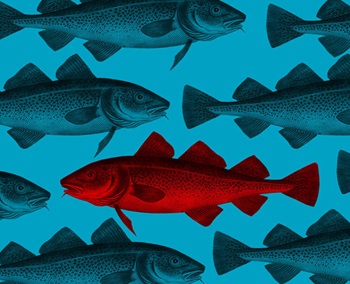 It’s been thirty-two years since the federal government first closed the northern cod fishery. It was historically the colony’s main trade for centuries, but that changed, nearly overnight, in 1992, after a press conference at the downtown Radisson Hotel in St. John’s, when then federal fisheries and oceans minister John Crosbie announced a complete halt. Fishery workers would be compensated for ten weeks, at the rate of $225 a week, and then go on employment insurance. The meagre amounts were seen as an insult to the workers whose labour was responsible for a $700 million per year industry (almost $1.35 billion in 2024 terms)—and who recognized, in the mass layoff, the spectre of their culture on the brink of extinction. Of course, fishery workers weren’t the only people who would suffer from the shuttering. With fishing boats now idle, fuel sales dropped. Schools amalgamated across communities as young families moved elsewhere and school districts struggled to fill classrooms. Those of us who lived through it will remember how local businesses offering small luxuries—restaurants and cafeterias, hair salons, cinemas—all felt the sting of a laid-off workforce. more, >>CLICK TO READ<< 07:48
It’s been thirty-two years since the federal government first closed the northern cod fishery. It was historically the colony’s main trade for centuries, but that changed, nearly overnight, in 1992, after a press conference at the downtown Radisson Hotel in St. John’s, when then federal fisheries and oceans minister John Crosbie announced a complete halt. Fishery workers would be compensated for ten weeks, at the rate of $225 a week, and then go on employment insurance. The meagre amounts were seen as an insult to the workers whose labour was responsible for a $700 million per year industry (almost $1.35 billion in 2024 terms)—and who recognized, in the mass layoff, the spectre of their culture on the brink of extinction. Of course, fishery workers weren’t the only people who would suffer from the shuttering. With fishing boats now idle, fuel sales dropped. Schools amalgamated across communities as young families moved elsewhere and school districts struggled to fill classrooms. Those of us who lived through it will remember how local businesses offering small luxuries—restaurants and cafeterias, hair salons, cinemas—all felt the sting of a laid-off workforce. more, >>CLICK TO READ<< 07:48
Lebouthillier Ignored Scientific Advice on Reopening Cod Fishery
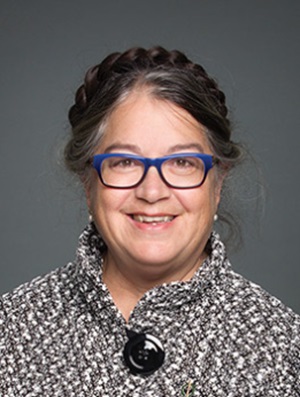 Federal Fisheries Minister Diane Lebouthillier faced criticism for disregarding advice from the Department of Fisheries and Oceans (DFO) when she reopened the commercial cod fishery off Newfoundland and Labrador earlier this year, a decision largely influenced by political considerations. Patrick Butler of Radio Canada reports that a DFO briefing note from 09 May 2024 uncovered by reveals that the department recommended maintaining the longstanding moratorium on northern cod, citing scientific evidence of the stock’s vulnerability. However, political advisors within the minister’s office advocated for reopening the fishery and increasing cod quotas, viewing it as a “political victory.” Senior policy advisor Paul Carrigan expressed concerns from DFO staff about the risk of stock decline due to higher quotas and the return of offshore vessels. The department had recommended keeping the total allowable catch at 13,000 tonnes, the same level as in 2022 and 2023, while maintaining a limited stewardship fishery solely for inshore harvesters. more, >>CLICK TO READ<< 12:05
Federal Fisheries Minister Diane Lebouthillier faced criticism for disregarding advice from the Department of Fisheries and Oceans (DFO) when she reopened the commercial cod fishery off Newfoundland and Labrador earlier this year, a decision largely influenced by political considerations. Patrick Butler of Radio Canada reports that a DFO briefing note from 09 May 2024 uncovered by reveals that the department recommended maintaining the longstanding moratorium on northern cod, citing scientific evidence of the stock’s vulnerability. However, political advisors within the minister’s office advocated for reopening the fishery and increasing cod quotas, viewing it as a “political victory.” Senior policy advisor Paul Carrigan expressed concerns from DFO staff about the risk of stock decline due to higher quotas and the return of offshore vessels. The department had recommended keeping the total allowable catch at 13,000 tonnes, the same level as in 2022 and 2023, while maintaining a limited stewardship fishery solely for inshore harvesters. more, >>CLICK TO READ<< 12:05
In cod we trust: Newfoundland’s famous fish aims at a comeback, but not everyone’s happy
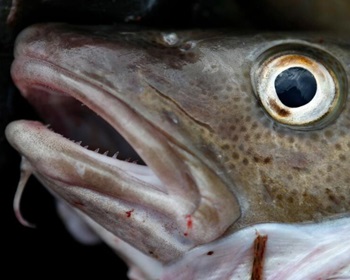 By 1992, the mighty cod had been fished to near oblivion, and the federal government declared a moratorium, indefinitely closing the industry in the hopes that the cod stock could rebuild itself over time. Some 30,000 Newfoundlanders lost their jobs and 10 per cent of the population headed west to Ontario, Alberta and beyond to find work in a mass outmigration the province has never fully recovered from. But if there is one truth in this life, it is that it is hard not to root for a good comeback story. Cod, in theory, was positioned to be such a comeback kid this summer when the federal government in June announced that the moratorium on the commercial cod fishery was being lifted after 32 years. Yet instead of parades, parties and fireworks, the announcement was met with discontent, particularly among small, inshore fish harvesters. That is, the skippers and salty olde sea dogs and their crews, wresting a living from the sea in small, 15-metre boats or less, who claim the end of the moratorium and return of the massive offshore “draggers” to the cod fishery is the beginning of the end for the North Atlantic cod 2.0. photos, more, >>CLICK TO READ<< 09:10
By 1992, the mighty cod had been fished to near oblivion, and the federal government declared a moratorium, indefinitely closing the industry in the hopes that the cod stock could rebuild itself over time. Some 30,000 Newfoundlanders lost their jobs and 10 per cent of the population headed west to Ontario, Alberta and beyond to find work in a mass outmigration the province has never fully recovered from. But if there is one truth in this life, it is that it is hard not to root for a good comeback story. Cod, in theory, was positioned to be such a comeback kid this summer when the federal government in June announced that the moratorium on the commercial cod fishery was being lifted after 32 years. Yet instead of parades, parties and fireworks, the announcement was met with discontent, particularly among small, inshore fish harvesters. That is, the skippers and salty olde sea dogs and their crews, wresting a living from the sea in small, 15-metre boats or less, who claim the end of the moratorium and return of the massive offshore “draggers” to the cod fishery is the beginning of the end for the North Atlantic cod 2.0. photos, more, >>CLICK TO READ<< 09:10
FFAW celebrating decision against seafood processors in snow crab dispute
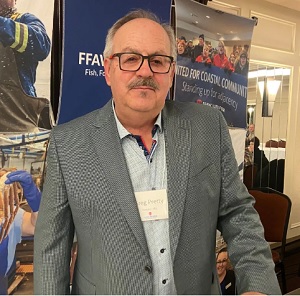 The Fish, Food and Allied Workers union is celebrating a ruling over last year’s payment dispute for snow crab that the union president estimates will net a collective $3.3 million payout for harvesters. FFAW filed the grievance against the Association of Seafood Producers (ASP) on the removal of the 20 per cent tolerance for snow crab in 2023. The tolerance had previously allowed harvesters to be paid the minimum price for their entire catch as long as the percentage of crab under four inches, but still of legal size, was less than 20 per cent. On Aug. 5 the arbiter ruled in favour of the fish harvesters union. “These processors have processing licenses from the province, and I expect them to behave in a more honourable manner than what they’ve been doing,” FFAW president Greg Pretty told CBC News. “It’s important not only that the harvesters get their money back, but that it shines a light on behaviours of crab processing companies in this province.” He said fish harvesters are owed approximately $3.3 million from 2023 from processing companies. more, >>CLICK TO READ<< 14:19
The Fish, Food and Allied Workers union is celebrating a ruling over last year’s payment dispute for snow crab that the union president estimates will net a collective $3.3 million payout for harvesters. FFAW filed the grievance against the Association of Seafood Producers (ASP) on the removal of the 20 per cent tolerance for snow crab in 2023. The tolerance had previously allowed harvesters to be paid the minimum price for their entire catch as long as the percentage of crab under four inches, but still of legal size, was less than 20 per cent. On Aug. 5 the arbiter ruled in favour of the fish harvesters union. “These processors have processing licenses from the province, and I expect them to behave in a more honourable manner than what they’ve been doing,” FFAW president Greg Pretty told CBC News. “It’s important not only that the harvesters get their money back, but that it shines a light on behaviours of crab processing companies in this province.” He said fish harvesters are owed approximately $3.3 million from 2023 from processing companies. more, >>CLICK TO READ<< 14:19
Free fish and smiley faces won’t reverse Ottawa decision to unleash draggers on northern cod (although blockading St. John’s harbour would)
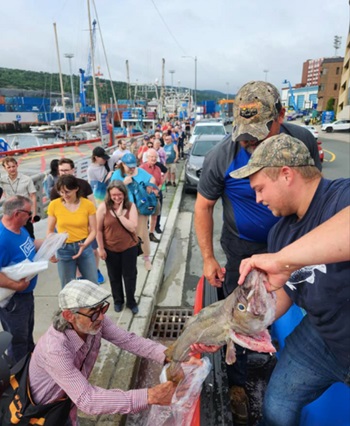 The FFAW regularly goes through protest motions, but its resolve to stand up for inshore boats is forever suspect when the union is conflicted by also representing offshore draggers, and onshore plants — and collects a paycheque from the feds. Now that Ottawa has opened the door to offshore dragging the inshore wants in on it too. Some Labrador (2J) harvesters have asked DFO to be allowed to drag for cod this year, and some 3K (northeast coast) and 3L (east coast) harvesters are right behind them with the same request. The union’s resolve against dragging for northern cod is sure to weaken. Exchanging cod for signatures won’t cut it. Blockading St. John’s harbour might be a bit extreme, but there should be a sweet spot somewhere the middle. Harvesters themselves must take a stand, like they did last spring with the snow crab price on the steps of Confederation Building. Now is the time for John Efford to rise again. more, >>CLICK TO READ<< 10:35
The FFAW regularly goes through protest motions, but its resolve to stand up for inshore boats is forever suspect when the union is conflicted by also representing offshore draggers, and onshore plants — and collects a paycheque from the feds. Now that Ottawa has opened the door to offshore dragging the inshore wants in on it too. Some Labrador (2J) harvesters have asked DFO to be allowed to drag for cod this year, and some 3K (northeast coast) and 3L (east coast) harvesters are right behind them with the same request. The union’s resolve against dragging for northern cod is sure to weaken. Exchanging cod for signatures won’t cut it. Blockading St. John’s harbour might be a bit extreme, but there should be a sweet spot somewhere the middle. Harvesters themselves must take a stand, like they did last spring with the snow crab price on the steps of Confederation Building. Now is the time for John Efford to rise again. more, >>CLICK TO READ<< 10:35






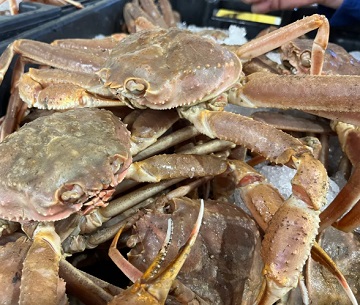 The province’s price-setting panel has sided with the Fish, Food and Allied Workers’ snow crab pricing offer of a $4.97 per pound floor price this season. In a press release Thursday evening, Thursday evening, FFAW president Dwan Street wrote that the decision is “historically significant. “Today’s panel decision is finally putting a system in place that gives harvesters a sense of fairness and transparency,” the release continued. The decision came the same day the 2025 season opened. In a Facebook post Thursday afternoon, the FFAW stated it was “mobilizing efforts to locate buyers willing to pay the FFAW price — regardless of the panel outcome.”
The province’s price-setting panel has sided with the Fish, Food and Allied Workers’ snow crab pricing offer of a $4.97 per pound floor price this season. In a press release Thursday evening, Thursday evening, FFAW president Dwan Street wrote that the decision is “historically significant. “Today’s panel decision is finally putting a system in place that gives harvesters a sense of fairness and transparency,” the release continued. The decision came the same day the 2025 season opened. In a Facebook post Thursday afternoon, the FFAW stated it was “mobilizing efforts to locate buyers willing to pay the FFAW price — regardless of the panel outcome.”  The Association of Seafood Producers had its first day in court on Wednesday, challenging the Newfoundland and Labrador government and fisheries union over what it calls “political interference” during price setting negotiations ahead of the snow crab season. The court challenge was prompted when Fisheries Minister Gerry Byrne moved the price setting deadline to April 13, following a request from the Fish, Food and Allied Workers union. The ASP says Byrne acted contrary to the Fishing Industry Collective Bargaining Act and turned to the Supreme Court of Newfoundland and Labrador to quash the date change. “If the minister’s decision is quashed, and we expect it to be because he broke the law, then we’re in the situation where we don’t have a minister’s date,” ASP executive director Jeff Loder told reporters outside of the courthouse on Wednesday.
The Association of Seafood Producers had its first day in court on Wednesday, challenging the Newfoundland and Labrador government and fisheries union over what it calls “political interference” during price setting negotiations ahead of the snow crab season. The court challenge was prompted when Fisheries Minister Gerry Byrne moved the price setting deadline to April 13, following a request from the Fish, Food and Allied Workers union. The ASP says Byrne acted contrary to the Fishing Industry Collective Bargaining Act and turned to the Supreme Court of Newfoundland and Labrador to quash the date change. “If the minister’s decision is quashed, and we expect it to be because he broke the law, then we’re in the situation where we don’t have a minister’s date,” ASP executive director Jeff Loder told reporters outside of the courthouse on Wednesday.  There’s been lots of talk of knocking down interprovincial trade barriers to help promote the buy Canadian campaign launched in response to American tariff threats, but it’s unlikely those efforts will benefit the fishery much. Those involved in the Newfoundland and Labrador fishery have sounded the alarm, warning that the fishery would be among the province’s industries hit hardest by the 25 per cent tariffs on all Canadian exports United States President Donald Trump has promised to impose. The response of the fishing industry has been to express a need to expand its markets beyond the U.S., where much of the locally caught and processed product is sold.
There’s been lots of talk of knocking down interprovincial trade barriers to help promote the buy Canadian campaign launched in response to American tariff threats, but it’s unlikely those efforts will benefit the fishery much. Those involved in the Newfoundland and Labrador fishery have sounded the alarm, warning that the fishery would be among the province’s industries hit hardest by the 25 per cent tariffs on all Canadian exports United States President Donald Trump has promised to impose. The response of the fishing industry has been to express a need to expand its markets beyond the U.S., where much of the locally caught and processed product is sold. 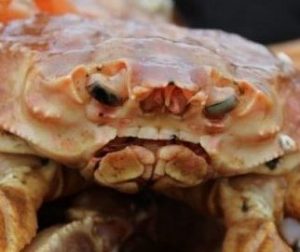 In regard to the current discussions around the crab fishery as it faces potential U.S. tariffs, we want to suggest a solution. Both the Fish Food and Allied Workers union and the Association of Seafood Processors acknowledge that the threat of those tariffs creates significant challenges around developing a price-setting formula and setting wharf prices. The tariffs pose a risk that the harvest and processing might be severely disrupted, with serious impacts on all involved. We have been studying and observing this harvest and processing for decades, and this year it is especially difficult. Our suggestions are that for the 2025 season, harvesters and processors would agree to the following:
In regard to the current discussions around the crab fishery as it faces potential U.S. tariffs, we want to suggest a solution. Both the Fish Food and Allied Workers union and the Association of Seafood Processors acknowledge that the threat of those tariffs creates significant challenges around developing a price-setting formula and setting wharf prices. The tariffs pose a risk that the harvest and processing might be severely disrupted, with serious impacts on all involved. We have been studying and observing this harvest and processing for decades, and this year it is especially difficult. Our suggestions are that for the 2025 season, harvesters and processors would agree to the following: 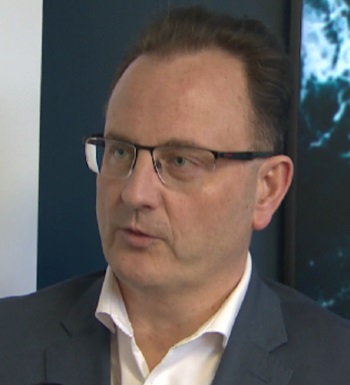 Newfoundland and Labrador industries with strong ties to the U.S. are bracing for impact in the face of President Donald Trump’s 25 per cent tariff threat, but some advocates are calling for a future where companies don’t exclusively rely on a trading partner to the south. On Saturday, the U.S. could impose tariffs on incoming Canadian goods. That has left some Newfoundland and Labrador industries worried. Association of Seafood Producers executive director Jeff Loder said Newfoundland and Labrador’s fishery is at stake under the threat of tariffs. About 90 per cent of snow crab harvested in the province is shipped to the U.S. “The snow crab fishery is set to open in the middle of March. This is already impacting negotiations between ASP and the FFAW. It will be one of the first sectors that’s directly impacted,” he said.
Newfoundland and Labrador industries with strong ties to the U.S. are bracing for impact in the face of President Donald Trump’s 25 per cent tariff threat, but some advocates are calling for a future where companies don’t exclusively rely on a trading partner to the south. On Saturday, the U.S. could impose tariffs on incoming Canadian goods. That has left some Newfoundland and Labrador industries worried. Association of Seafood Producers executive director Jeff Loder said Newfoundland and Labrador’s fishery is at stake under the threat of tariffs. About 90 per cent of snow crab harvested in the province is shipped to the U.S. “The snow crab fishery is set to open in the middle of March. This is already impacting negotiations between ASP and the FFAW. It will be one of the first sectors that’s directly impacted,” he said. 


























